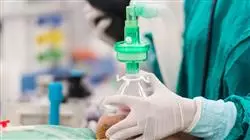University certificate
The world's largest faculty of medicine”
Introduction to the Program
This academic program, developed 100% online, offers the ease of choosing the best time and place to study. Thanks to the modern technology and teaching methodology that TECH has, with just a device with an Internet connection and the best disposition they will advance towards the goal in just 6 weeks. Therefore, the graduate will have a broad documentary source of all the new trends and contextualization of the Therapeutic Management of the Poisoned Patient.

A 100% online academic program with the most up-to-date content in Therapeutic Management of the Poisoned Patient”
Module 1. Therapeutic Management of the Poisoned Patient: Specific Treatmen
1.1. The Three Phases of the Specific Treatment of Poisoning
1.2. Decrease Toxin Absorption
1.2.1. Digestive Decontamination
1.2.1.1. Emetics
1.2.1.2. Gastric lavage
1.2.1.3. Activated Carbon
1.2.1.4. Cathartics
1.2.1.5. Whole Bowel Irrigation
1.2.2. Skin Decontamination
1.2.3. Ocular Decontamination
1.2.4. Prevention of Parenteral Absorption
1.2.5. Prevention of Pulmonary Absorption
1.2.6. Endoscopy and Surgery
1.2.7. Dilution
1.2.8. Conclusions and Key Points
1.3. Increasing Toxicant Elimination
1.3.1. Kidney Cleanse
1.3.1.1. Forced Diuresis
1.3.1.2. Alkaline Diuresis
1.3.2. Extrarenal Purification
1.3.2.1. Dialysis
1.3.2.2. Hemoperfusion, Hemofiltration, Hemodiafiltration
1.3.2.3. Plasmapheresis and Exchange Transfusion
1.3.2.4. Conclusions and Key Points
1.4. Antidotes
1.4.1. Main Antidotes
1.4.1.1. Indications, Contraindications, Side Effects and Precautions
1.4.1.2. Dose
1.4.2. Minimum Stock of Antidotes Depending on the Type of Hospital or Health Center
1.4.3. Conclusions and Key Points
1.5. Antidotes
1.5.1 Nasogastric or Orogastric Tube Placement Technique and Gastric Lavage
1.5.2 Skin and Ocular Decontamination Techniques
Module 2. Therapeutic Management of the Poisoned Patient: Additional Aspects
2.1. General Outline of Additional Aspects to Consider
2.2. The Suicidal Patient and Toxicology. Psychiatric Assessment
2.2.1. Introduction
2.2.2. Risk Factors for Self-Harming Behavior
2.2.3. Determining the Severity of Self-Harm Attempts
2.2.4. Suicidal Patient Management
2.2.5. Conclusions and Key Points
2.3. Medical and Legal Aspects of Toxicological Care
2.3.1. Introduction
2.3.2. Report to the Court
2.3.3. Medical and Legal Autopsy
2.3.4. Sampling of the Patient Corpse
2.3.5. Informed Consent and Voluntary Discharge of the Poisoned Patient
2.3.6. The Extraction of Blood Samples for Toxicological Studies in the Emergency Room
2.3.7. Conclusions and Key Points
2.4. Protective Measures for Health Care Personnel
2.4.1. Introduction
2.4.2. Personal Protective Equipment (PPE)
2.4.3. Poison Prevention Measures for Healthcare Personnel
2.4.4. Conclusions and Key Points
2.5. General Criteria for Admission to an Intensive Care Unit
2.5.1. Introduction
2.5.2. Criteria Table
2.5.3. Conclusions and Key Points
2.6. Toxicant-Induced Rhabdomyolysis
2.6.1. Introduction
2.6.2. Definition and Pathophysiology
2.6.3. General Etiology and Toxicological Causes of Rhabdomyolysis
2.6.4. Clinical Manifestations, Laboratory Tests and Complications
2.6.5. Treatment
2.6.6. Conclusions and Key Points
2.7. Toxicant-Induced Methemoglobinemia
2.7.1. Introduction
2.7.2. Pathophysiology
2.7.3. Etiology of Methemoglobinemia
2.7.4. Clinical Manifestations
2.7.5. Suspected, Differential and Confirmatory Diagnosis
2.7.6. Treatment
2.8. Hypersensitivity and Anaphylaxis Secondary to Poisonings by Animal Stings or Bites
2.8.1. Introduction
2.8.2. Etiology
2.8.3. Hypersensitivity Types
2.8.4. Clinical Manifestations
2.8.5. Diagnosis
2.8.6. Treatment Management
2.8.7. Conclusions and Key Points
2.9. Emergencies Associated with Psychotropic Drugs
2.9.1. Introduction
2.9.2. Neuroleptic Malignant Syndrome.
2.9.2.1. Definition and Risk Factors
2.9.2.2. Clinical Manifestations and Differential Diagnosis
2.9.2.3. Treatment
2.9.3. Serotonin Syndrome
2.9.3.1. Causes
2.9.3.2. Clinical Manifestations and Differential Diagnosis
2.9.3.3. Treatment
2.9.4. Acute Dystonia
2.9.5. Drug-Induced Parkinsonism
2.9.6. Conclusions and Key Points

Make the most of this opportunity to learn about the latest advances in this subject to apply it to your daily practice"
Why study at TECH?
TECH is the world’s largest online university. With an impressive catalog of more than 14,000 university programs available in 11 languages, it is positioned as a leader in employability, with a 99% job placement rate. In addition, it relies on an enormous faculty of more than 6,000 professors of the highest international renown.

Study at the world's largest online university and guarantee your professional success. The future starts at TECH”
The world’s best online university according to FORBES
The prestigious Forbes magazine, specialized in business and finance, has highlighted TECH as “the world's best online university” This is what they have recently stated in an article in their digital edition in which they echo the success story of this institution, “thanks to the academic offer it provides, the selection of its teaching staff, and an innovative learning method aimed at educating the professionals of the future”
A revolutionary study method, a cutting-edge faculty and a practical focus: the key to TECH's success.
The most complete study plans on the university scene
TECH offers the most complete study plans on the university scene, with syllabuses that cover fundamental concepts and, at the same time, the main scientific advances in their specific scientific areas. In addition, these programs are continuously being updated to guarantee students the academic vanguard and the most in-demand professional skills. In this way, the university's qualifications provide its graduates with a significant advantage to propel their careers to success.
TECH offers the most comprehensive and intensive study plans on the current university scene.
A world-class teaching staff
TECH's teaching staff is made up of more than 6,000 professors with the highest international recognition. Professors, researchers and top executives of multinational companies, including Isaiah Covington, performance coach of the Boston Celtics; Magda Romanska, principal investigator at Harvard MetaLAB; Ignacio Wistumba, chairman of the department of translational molecular pathology at MD Anderson Cancer Center; and D.W. Pine, creative director of TIME magazine, among others.
Internationally renowned experts, specialized in different branches of Health, Technology, Communication and Business, form part of the TECH faculty.
A unique learning method
TECH is the first university to use Relearning in all its programs. It is the best online learning methodology, accredited with international teaching quality certifications, provided by prestigious educational agencies. In addition, this disruptive educational model is complemented with the “Case Method”, thereby setting up a unique online teaching strategy. Innovative teaching resources are also implemented, including detailed videos, infographics and interactive summaries.
TECH combines Relearning and the Case Method in all its university programs to guarantee excellent theoretical and practical learning, studying whenever and wherever you want.
The world's largest online university
TECH is the world’s largest online university. We are the largest educational institution, with the best and widest online educational catalog, one hundred percent online and covering the vast majority of areas of knowledge. We offer a large selection of our own degrees and accredited online undergraduate and postgraduate degrees. In total, more than 14,000 university degrees, in eleven different languages, make us the largest educational largest in the world.
TECH has the world's most extensive catalog of academic and official programs, available in more than 11 languages.
Google Premier Partner
The American technology giant has awarded TECH the Google Google Premier Partner badge. This award, which is only available to 3% of the world's companies, highlights the efficient, flexible and tailored experience that this university provides to students. The recognition as a Google Premier Partner not only accredits the maximum rigor, performance and investment in TECH's digital infrastructures, but also places this university as one of the world's leading technology companies.
Google has positioned TECH in the top 3% of the world's most important technology companies by awarding it its Google Premier Partner badge.
The official online university of the NBA
TECH is the official online university of the NBA. Thanks to our agreement with the biggest league in basketball, we offer our students exclusive university programs, as well as a wide variety of educational resources focused on the business of the league and other areas of the sports industry. Each program is made up of a uniquely designed syllabus and features exceptional guest hosts: professionals with a distinguished sports background who will offer their expertise on the most relevant topics.
TECH has been selected by the NBA, the world's top basketball league, as its official online university.
The top-rated university by its students
Students have positioned TECH as the world's top-rated university on the main review websites, with a highest rating of 4.9 out of 5, obtained from more than 1,000 reviews. These results consolidate TECH as the benchmark university institution at an international level, reflecting the excellence and positive impact of its educational model.” reflecting the excellence and positive impact of its educational model.”
TECH is the world’s top-rated university by its students.
Leaders in employability
TECH has managed to become the leading university in employability. 99% of its students obtain jobs in the academic field they have studied, within one year of completing any of the university's programs. A similar number achieve immediate career enhancement. All this thanks to a study methodology that bases its effectiveness on the acquisition of practical skills, which are absolutely necessary for professional development.
99% of TECH graduates find a job within a year of completing their studies.
Postgraduate Certificate in Therapeutic Management of the Poisoned Patient
The management of intoxicated patients is a crucial task in emergency medical care. Healthcare professionals need to be prepared to efficiently treat patients who have suffered a poisoning, regardless of the cause or severity of the poisoning. For this reason, the Postgraduate Certificate in Therapeutic Management of the Intoxicated Patient is an excellent option for healthcare professionals who wish to acquire specialized skills in the treatment of intoxicated patients. This Postgraduate Certificate is designed to provide students with a thorough understanding of the management of intoxicated patients, including the identification of symptoms and the implementation of appropriate treatments. Students will also learn how to handle emergency situations, such as cardiopulmonary resuscitation (CPR) and the use of antidotal medications to treat intoxication. Being led by highly trained health professionals experienced in the management of intoxicated patients, you will have the opportunity to learn from experts in the field, and you will receive comprehensive theoretical and practical teaching to be able to apply the acquired knowledge in real situations.
TECH offers you the most up-to-date content
For health professionals, the Postgraduate Certificate in Therapeutic Management of the Intoxicated Patient is a unique opportunity to develop specialized skills in the management of patients with intoxication. After completing the course, you will be able to make a big difference in the quality of care patients receive, while gaining a competitive advantage in the job market. At the end of the course, you will be equipped with the skills necessary to identify and properly treat intoxicated patients. You will also be able to work as a team with other healthcare professionals to ensure a comprehensive and complete approach to patient care. Undoubtedly, an excellent opportunity to update your daily clinical practice 100% online with the convenience and quality you will find in one place.







